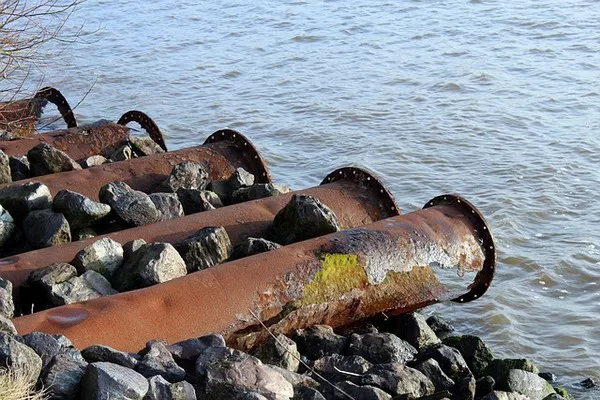A foul, lingering sewer smell inside your home can be both unpleasant and concerning. The noxious odor can originate from various sources, and understanding the root causes is essential to address and eliminate the problem effectively. This article delves into the common reasons behind the sewer smell in houses, offering insights into prevention and mitigation strategies.
1. Blocked or Clogged Drains
One of the primary causes of sewer odors inside a home is blocked or clogged drains. When drains, including sink, shower, or toilet drains, become obstructed by debris, grease, or hair, it can lead to slow water flow or even complete blockages. These blockages can trap organic matter and cause it to decompose, producing a foul smell.
Prevention and Solution:
Regularly clean and maintain your drains by using drain cleaners or seeking professional plumbing services if necessary. Install drain strainers to prevent hair and debris from entering the pipes.
2. Dry P-Traps
P-Traps are U-shaped pipe sections that are essential in preventing sewer gases from entering your living space. When water evaporates from these traps, it creates a gap that allows sewer gases to escape into your home.
Prevention and Solution:
Run water in unused sinks, showers, and floor drains to keep P-Traps filled with water. This will act as a barrier against the escape of sewer gases.
3. Damaged or Cracked Sewer Lines
Damaged or cracked sewer lines are a severe and costly issue that can result in sewer odors inside your home. These damages can allow sewage to leak into the soil around your property, and as a result, gases can infiltrate your living space.
Prevention and Solution:
Regular inspection of your sewer lines is crucial. If you suspect any damage, contact a professional plumber to assess and repair the issue promptly.
4. Inadequate Ventilation
Proper ventilation is crucial for your plumbing system to function correctly. When your plumbing system lacks adequate ventilation, it can lead to a build-up of sewer gases, which may escape into your home, causing unpleasant odors.
Prevention and Solution:
Ensure that your plumbing system is properly vented to allow for the release of sewer gases. A professional plumber can assess your system’s ventilation and make necessary improvements.
5. Sewer Backup
Sewer backups are among the most distressing and smelly problems homeowners can encounter. A sewer backup occurs when the main sewer line is clogged or obstructed, causing wastewater to back up into your home’s plumbing system.
Prevention and Solution:
To prevent sewer backups, avoid disposing of non-flushable items down the toilet, such as wet wipes, hygiene products, or cooking grease. Regularly maintain your plumbing system to minimize the risk of clogs and blockages. In the event of a sewer backup, contact a professional plumber immediately to address the issue and prevent further damage.
6. Faulty Wax Ring or Toilet Seal
Toilet seals, also known as wax rings, provide a watertight barrier between the toilet and the floor flange. When these seals deteriorate or become damaged, sewer gases can escape from beneath the toilet and permeate your home.
Prevention and Solution:
Regularly inspect the condition of the toilet seal and replace it if necessary. This simple maintenance task can prevent sewer odors from entering your home.
7. Septic Tank Issues
If your home is connected to a septic tank system, issues with the tank can lead to sewer smells inside your home. A full or malfunctioning septic tank can release sewage odors into the surrounding environment, including your living space.
Prevention and Solution:
Schedule regular maintenance and inspections of your septic tank system to ensure it functions correctly. Pump your septic tank as recommended by a professional to prevent overflows and odors.
8. Leaky or Damaged Toilet
A leaky or damaged toilet can be a common source of sewer odors. When the wax ring or other components of the toilet are compromised, sewage gases can escape into the bathroom and adjacent areas.
Prevention and Solution:
Regularly inspect your toilet for any leaks or damage and promptly address any issues. Ensure that the wax ring is intact and sealing the toilet to the floor properly.
See Also: Anaerobic Wastewater Treatment: All You Need to Know
9. Mold Growth
Mold can sometimes emit an unpleasant, musty odor that is reminiscent of sewage. Mold growth can occur in areas with excess moisture, such as bathrooms or basements, and may be mistaken for a sewer smell.
Prevention and Solution:
Maintain proper ventilation and moisture control in your home to prevent mold growth. If you suspect mold, consult with a professional mold remediation specialist to address the issue.
Conclusion
A sewer smell in your house can be a distressing and uninviting problem. Understanding the root causes is crucial for effective prevention and mitigation. By addressing issues like blocked drains, dry P-Traps, damaged sewer lines, inadequate ventilation, sewer backups, faulty toilet seals, septic tank problems, leaky toilets, and mold growth, you can eliminate or minimize the odors and maintain a healthy, odor-free living environment. Regular maintenance, inspections, and timely professional assistance are essential in keeping your home free from sewer smells.

